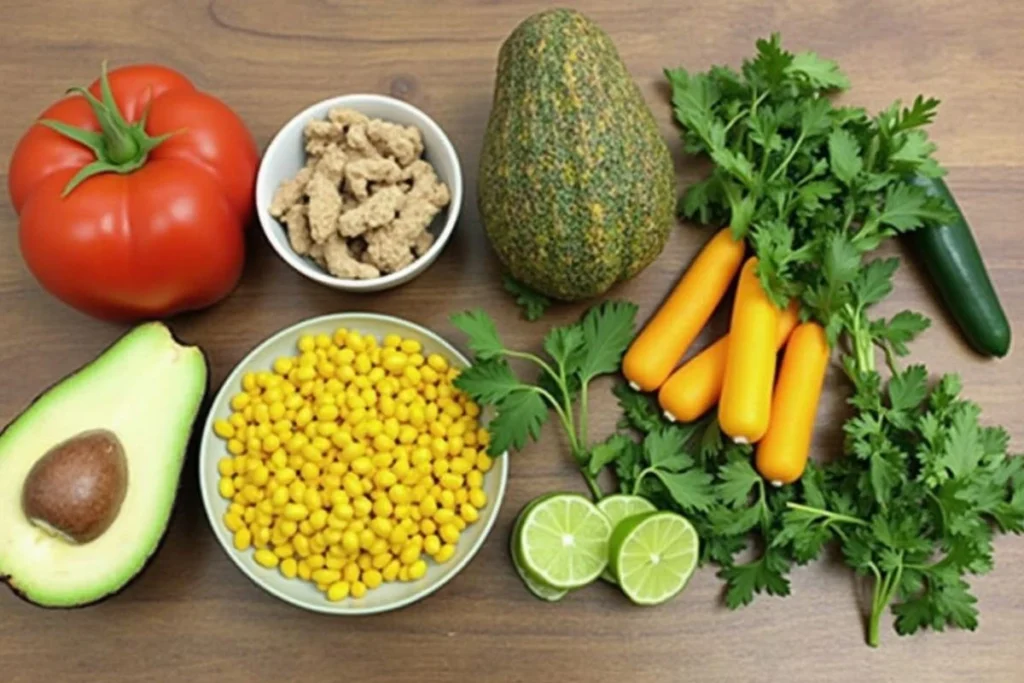Imagine waking up each morning feeling more energized, balanced, and lighter. Your digestion flows smoothly, your skin has a natural glow, and you’re equipped to tackle the day with renewed vitality. Many people claim that adopting an alkaline vegan diet can help you achieve all of this and more. But is this just another health fad, or is there real science behind it? In this article, we’ll dive deep into the truth behind the health benefits of an alkaline vegan diet, helping you understand if it’s a lifestyle worth embracing.
Table of Contents
What is an Alkaline Vegan Diet?
Before we dive into the specifics, let’s first break down what an alkaline vegan diet actually is. At its core, this diet emphasizes plant-based foods that help balance the body’s pH levels. The theory behind the alkaline vegan diet is based on the idea that consuming foods that are more alkaline (or less acidic) can lead to better health outcomes.
The Basics of an Alkaline Diet
In the alkaline vegan diet, you focus on foods that are considered alkaline once metabolized, including most vegetables, fruits, nuts, and seeds. These foods are thought to help neutralize excess acidity in the body, potentially reducing inflammation and supporting overall well-being. This differs from a typical vegan diet, which can still include acidic foods like coffee, sugar, and processed items.
The Science Behind the Alkaline Vegan Diet
Understanding pH and the Body’s Balance
Our body maintains a certain pH level to function optimally, and this level varies in different parts of the body. For example, your stomach is naturally acidic, while your blood remains slightly alkaline. The theory behind the alkaline vegan diet is that when we consume more alkaline foods, we can help keep the body’s pH level in balance, reducing acidity in the bloodstream and tissues.
It’s important to note, however, that your blood’s pH is tightly regulated by your body, and eating an alkaline vegan diet won’t drastically alter it. What it can do, however, is influence the pH of your urine, which may signal that your body is more balanced internally.
Alkaline Fruits and Vegetables: The Power of Plant-Based Goodness
When it comes to an alkaline vegan diet, the key foods to focus on are alkaline fruits and vegetables. These foods not only help balance your body’s pH but also provide a wealth of essential nutrients that support your health. Here are some of the top alkaline foods to incorporate into your daily meals:
- Leafy Greens: Kale, spinach, and Swiss chard are rich in calcium and other nutrients while being alkaline-forming.
- Cucumbers and Avocados: Both are hydrating and contain healthy fats that are excellent for skin and overall health.
- Berries and Citrus Fruits: Lemons, strawberries, and blueberries are packed with antioxidants and vitamin C.
- Root Vegetables: Carrots, sweet potatoes, and beets provide vital nutrients and energy.
Incorporating these foods into your alkaline vegan diet not only helps with pH balance but also boosts your vitamin and mineral intake, which supports your immune system, bone health, and energy levels.

Benefits of an Alkaline Diet: Fact or Fiction?
You’ve probably heard claims that an alkaline vegan diet can do everything from improve your digestion to reduce your risk of chronic diseases. But are these benefits real, or just wishful thinking? Let’s take a closer look at some of the purported benefits.
Proven Benefits of Alkaline Diet Foods
1. Reduced Inflammation
Chronic inflammation is linked to a variety of health conditions, from arthritis to heart disease. The alkaline vegan diet may help reduce inflammation by eliminating acidic, processed foods and emphasizing anti-inflammatory plant-based options. Studies have shown that fruits and vegetables, especially those with high water content, like cucumbers and celery, are key for promoting an anti-inflammatory environment in the body.
2. Improved Digestion
The alkaline vegan diet focuses on foods that are rich in fiber, such as leafy greens, vegetables, and legumes. High-fiber foods support healthy digestion by promoting regular bowel movements and reducing bloating. By eliminating processed foods, the diet also reduces the strain on your digestive system, which can lead to more energy and less discomfort.
3. Bone Health
You might be surprised to learn that an alkaline vegan diet may also benefit your bones. Contrary to the misconception that vegan diets lack calcium, many alkaline foods—such as leafy greens and almonds—are excellent sources of calcium. By balancing pH levels, this diet may help prevent the body from leaching calcium from bones, thus supporting bone density and strength.
4. Support for Weight Loss
A major benefit of the alkaline vegan diet is its potential to support weight loss. By eliminating calorie-dense, processed foods, and focusing on whole plant foods, many people find they can shed excess weight while still feeling full and satisfied. The high fiber content helps regulate appetite and boosts metabolism, making it easier to maintain a healthy weight.
Debunking the Myths
While there are many benefits to an alkaline vegan diet, it’s important to separate fact from fiction. Some people claim that an alkaline diet can cure diseases like cancer or dramatically alter your blood pH levels. The truth is, the body is very good at regulating its pH balance on its own. The idea that food can directly change your blood pH is largely a myth.
What an alkaline vegan diet can do, however, is support overall health by providing essential nutrients and reducing the intake of inflammatory foods. It’s about building a sustainable, balanced lifestyle rather than seeking a quick fix for chronic health issues.

How to Build an Alkaline Diet Plan
Building a well-rounded alkaline vegan diet plan doesn’t have to be complicated. The key is to focus on whole, plant-based foods that are naturally alkaline-forming. Here’s how you can build a daily eating plan that supports your health:
Key Principles of a Balanced Alkaline Vegan Diet
- Focus on Whole, Plant-Based Foods: Fill your plate with a variety of alkaline fruits and vegetables, whole grains, legumes, nuts, and seeds.
- Avoid Acidic and Processed Foods: Limit or eliminate foods like caffeine, sugar, alcohol, and processed snacks, as these can increase acidity in the body.
- Hydrate Well: Drink plenty of water and herbal teas to support your body’s natural detoxification processes.
Sample 7-Day Alkaline Diet Plan
Here’s a simple 7-day alkaline vegan diet meal plan to get you started:
Day 1:
- Breakfast: Green smoothie with spinach, avocado, and lemon juice.
- Lunch: Quinoa salad with cucumbers, tomatoes, and lemon vinaigrette.
- Dinner: Grilled vegetables with a side of sautéed kale.
Day 2:
- Breakfast: Chia seed pudding with almond milk and blueberries.
- Lunch: Lentil soup with spinach and carrots.
- Dinner: Roasted sweet potatoes with avocado and mixed greens.
Challenges and Tips for Following an Alkaline Vegan Diet
While the alkaline vegan diet can be incredibly beneficial, there are some challenges to consider. First, it can be difficult to find certain alkaline foods, especially if you’re new to the diet. Here are some tips to make the transition smoother:
- Plan Ahead: Preparing meals in advance will help you stay on track and prevent you from reaching for processed or acidic foods.
- Substitute Ingredients: If you’re used to acidic foods like dairy or meat, look for plant-based alternatives like almond milk or tempeh.
- Stay Hydrated: Drinking plenty of water helps maintain the alkaline environment in your body.
FAQ: Your Alkaline Vegan Diet Questions Answered
1. What foods are included in an alkaline vegan diet?
The alkaline vegan diet includes a wide variety of plant-based foods, such as leafy greens, alkaline fruits and vegetables (like cucumbers and lemons), nuts, seeds, and legumes.
2. Are all fruits and vegetables alkaline?
Not all fruits and vegetables are alkaline, but many are. Common alkaline foods include spinach, kale, avocados, and cucumbers.
3. Can an alkaline vegan diet help with weight loss?
Yes, by focusing on whole, plant-based foods, an alkaline vegan diet can support weight loss by reducing calorie-dense processed foods and increasing fiber intake.
4. Is the alkaline vegan diet scientifically proven?
While the diet’s impact on blood pH is minimal, there is scientific support for the health benefits of consuming more plant-based, alkaline-forming foods, such as improved digestion and reduced inflammation.

Conclusion
The alkaline vegan diet offers a wealth of potential health benefits, from reduced inflammation to improved digestion and weight loss. While it’s not a miracle cure for diseases, it provides a sustainable approach to overall health by emphasizing nutrient-dense, plant-based foods. By following the principles of the alkaline vegan diet, you can support your body’s natural balance and enjoy greater vitality.
Ready to embrace the power of an alkaline vegan diet? Start by incorporating more alkaline fruits and vegetables into your meals, and see how this lifestyle can work for you. Your body will thank you.

